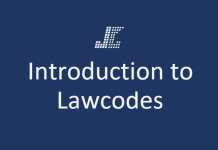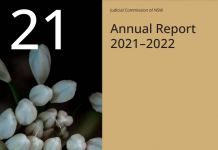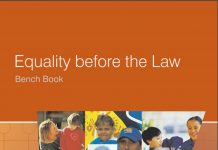Unless otherwise stated, section numbers refer to the Crimes (Sentencing Procedure) Act 1999.
Procedural fairness has been amended to include references to recent case law. HT v The Queen (2019) 93 ALJR 1307 has been added at [1-000] Proceedings in open court to clarify that courts have jurisdiction to modify the general rules of open justice and procedural fairness by tailoring non-publication orders to ensure an offender can test the accuracy of evidence and make submissions. Taylor v R [2018] NSWCCA 255 has been added at [1-010] Reasons for decision, noting that sentence remarks must be intelligible to lay people and that sentence judgments should not be constructed as a checklist. The court’s observation in Porter v R [2019] NSWCCA 117, that offenders and the community at large are entitled to know why and how a particular period of imprisonment has been assessed, has been included. Roylance v DPP [2019] NSWSC 933 has also been added, noting pressures on the Local Court does not obviate the need for giving reasons, even in ex-parte proceedings. At [1-040] Opportunity of addressing the court on issues, HT v The Queen, Anae v R [2018] NSWCCA 73, DL v The Queen (2018) 92 ALJR 764 and Purdie v R [2019] NSWCCA 22 have been added, emphasising the principles of impartiality and procedural fairness, and the opportunity to make submissions on relevant matters. Tarrant v R [2018] NSWCCA 21and Mansweto v R [2019] NSWCCA 232 have been included at [1-045] Excessive intervention by the court, highlighting circumstances where intervention by the court in proceedings is warranted and where it might result in a reasonable apprehension of bias.
Intensive correction orders (ICOs) has been updated with recent cases. [3-620] Restrictions on power to make ICO, has been revised to include Cross v R [2019] NSWCCA 280 which clarified that where a sentence for a single offence exceeds 2 years, and therefore an ICO can’t be imposed, there is no requirement for the court to consider s 66 of the Act. This case is also added at [3-632] Community safety paramount concern. The discussion in Karout v R [2019] NSWCCA 253, on the relationship between ss 66 and 3A has also been included.
Power to reduce penalties for assistance to authorities has been substantially revised and updated. Le v R [2019] NSWCCA 181 and Browning v R [2015] NSWCCA 147 have been added at [12-200] as examples to illustrate that not all information provided by an offender amounts to assistance within s 23. A new paragraph on Procedure has been added at [12-202] which summarises the approach to be taken when evidence of assistance is relied on in sentence proceedings. It includes Neil Harris (a pseudonym) v R [2019] NSWCCA 236 where the court observed the basis of tendering an affidavit of assistance should be agreed and clearly stated, and any restriction on its use identified. HT v The Queen (2019) 93 ALJR 1307, where the appellant was denied procedural fairness during the Crown appeal by not being provided with access to the affidavit of assistance has been included. Greentree v R [2018] NSWCCA 227 has been included for the proposition that it is not an error to refer to the “significance and the usefulness” of assistance without elaboration. Le v R [2019] NSWCCA 181 has also been added at [12-215] Broad scope of s 23(1) — “any other offence” where it was said that because a form of assistance is capable of falling within s 23(1) it does not necessarily warrant imposing a lesser sentence and at [12-218] Voluntary disclosure of unknown guilt, where the court concluded admissions concerning the period of time an offender was involved in offending did not amount to assistance within s 23(1) as otherwise unknown criminality was not disclosed. At [12-230] Application of discount, TL v R [2017] NSWCCA 308 has been added, which confirms that where an aggregate sentence is imposed the discount must be applied to each indicative sentence, not the aggregate sentence. At [12-240] Promised assistance, under the heading Appeals following a failure to provide promised assistance, R v Dimakos (a pseudonym) [2018] NSWCCA 78 (withdrawal of benefit where an offender has entered a bargain and fails to fulfil it); R v OE [2018] NSWCCA 83 and R v GD [2013] NSWCCA 212 (clarification of the power under s 5DA Criminal Appeal Act 1912 and the proper approach to reversing or adjusting a sentence to take account of a failure to adhere to an undertaking) have been added.
Sentencing Commonwealth offenders has been revised and updated. R v Nakash [2017] NSWCCA 196 and Rajabizadeh v R [2017] WASCA 133 have been added at [16-002] in Achieving consistency in sentencing to include a discussion of the issues associated with trying to equate certain Commonwealth offences with a State equivalent. At [16-010] Taking other offences into account: ss 16A(2)(b) and 16BA, the commentary has been updated to include Purves v R [2019] NSWCCA 227, which held the sentencing judge must make various statutory inquiries and obtain the necessary admissions and indication from the offender if they wish to have additional offences taken into account when passing sentence. Huang v R [2018] NSWCCA 57 has also been added where a five-judge bench unanimously held the principle in The Queen v De Simoni (1981) 147 CLR 383 is confined to offences for which an offender is sentenced, and does not extend to matters taken into account pursuant to s 16BA Crimes Act 1914 (Cth). R v MI [2018] NSWCCA 151 has been included in Failure to company with an undertaking, where the court found the offender’s partial assistance was worthless in a practical sense, there were no compelling countervailing factors and the entire discount for future assistance was removed. The commentary at [16-035] Sentencing for multiple offences has been updated to include Sheu v R [2018] NSWCCA 86, which clarifies that an aggregate sentence cannot be imposed for Commonwealth and State offences.
Detain for advantage/kidnapping has been substantially revised and updated to better reflect the current law in relation to the basis and aggravated forms of offences against s 86. Diaz v R [2018] NSWCCA 33, where it was held that a detention with no rational purpose is not necessarily less serious, has been added at [18-715] Factors relevant to the seriousness of an offence.
Assault, wounding and related offences has been substantially revised and updated. Now extraneous material has been removed. The cases of Swan v R [2016] NSWCCA 79 (grievous bodily harm), R v Hookey [2018] NSWCCA 147 and AM v R [2012] NSWCCA 203 (general sentencing principles) have been added. [50-040] Factors relevant to assessment of the objective gravity of a personal violence offence has been updated to include Waterfall v R [2019] NSWCCA 281 which held there is no rule or principle which mandates that the nature of the injuries sustained is the most important factor when determining the objective seriousness of an offence. At [50-080] Wound or inflict grievous bodily harm with intent to do grievous bodily harm or resist arrest: s 33, a reference to R v Hookey [2018] NSWCCA 147 has been added. The commentary at [50-100] Choking, suffocating and strangulation: s 37 has been rewritten. At [50-130] Particular types of personal violence, Waterfall v R [2019] NSWCCA 281 has been added under Prison officers. This case held that the vast power differential arising when a prison officer assaults an inmate is relevant to determining objective seriousness. A new paragraph titled Inmates has been added.
Domestic violence offences has been updated to include new cases. R v JD [2018] NSWCCA 233 has been added at [63-510] Sentencing approach to domestic violence, to include that serious domestic violence offences should attract appropriate sentences to maintain public confidence in the administration of justice. In Impact of AVO breaches in sentencing at [63-518], Turnbull v R [2019] NSWCCA 97, has been added to emphasise the need to show there will be a heavy price to pay for indulging in domestic violence particularly when court orders have been issued to prohibit such violence.
Commonwealth drug offences has also been updated with recent cases. Kuo v R [2018] NSWCCA 270 has been added at [65-130] under Distinguishing between “couriers” and “principals”. That case reinforces the principle in R v Olbrich (1999) 199 CLR 270 that it is more important to focus on what the offender did rather than attempting to characterise their relative role in a hierarchy. Klomfar v R [2019] NSWCCA 61, where the court found there is no inevitable correlation between an offender’s role and the severity of punishment they may receive, has also been added.
Appeals has been extensively revised and new cases added. At [70-030] under the heading Errors of fact and fact finding on appeal, the cases of Yin v R [2019] NSWCCA 217; Gibson v R [2019] NSWCCA 221 and TH v R [2019] NSWCCA 184 have been added. These cases do not support observations made in Hordern v R [2019] NSWCCA 138 that the long-standing approach in R v O’Donoghue (1988) 33 A Crim R 397, with respect to fact finding on appeal, should not be followed. At [70-040] The meaning of “sentence” in s 6(3), the text has been amended to include that, with respect to aggregate sentences imposed under s 53A of the Crimes (Sentencing Procedure) Act 1999, the preponderance of case law since JM v R (2014) 246 A Crim R 528 is that an appeal is against the aggregate sentence not the individual indicative sentences. At [70-060] in Evidence of facts that have arisen entirely after sentence, Agnew (a pseudonym) v R [2018] NSWCCA 128 has been added, where the court confirmed that a post-sentence reduction in a custodial sentence for assistance to authorities can be achieved by means of an appeal where no error or miscarriage has been found should not be encouraged. At [70-125] Appeals to the Supreme Court from the Local Court, Devitt v Ross [2018] NSWSC 1675 has been added, confirming the Supreme Court does not have jurisdiction to hear an appeal against a Local Court sentence if an appeal in the District Court has already been dismissed.
The commentary at [90-000]ff in relation to Mental Health (Forensic Provisions) Act 1990 has been revised to cross-reference to relevant sections of the Local Court Bench Book.










